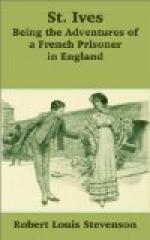and champaign but actually over the thoroughfares of
a capital city, which we could see blackened by day
with the moving crowd of the inhabitants, and at night
shining with lamps. And lastly, although I was
not insensible to the restraints of prison or the
scantiness of our rations, I remembered I had sometimes
eaten quite as ill in Spain, and had to mount guard
and march perhaps a dozen leagues into the bargain.
The first of my troubles, indeed, was the costume
we were obliged to wear. There is a horrible
practice in England to trick out in ridiculous uniforms,
and as it were to brand in mass, not only convicts
but military prisoners, and even the children in charity
schools. I think some malignant genius had found
his masterpiece of irony in the dress which we were
condemned to wear: jacket, waistcoat, and trousers
of a sulphur or mustard yellow, and a shirt or blue-and-white
striped cotton. It was conspicuous, it was cheap,
it pointed us out to laughter—we, who were
old soldiers, used to arms, and some of us showing
noble scars,—like a set of lugubrious zanies
at a fair. The old name of that rock on which
our prison stood was (I have heard since then) the
Painted Hill. Well, now it was all painted a
bright yellow with our costumes; and the dress of
the soldiers who guarded us being of course the essential
British red rag, we made up together the elements
of a lively picture of hell. I have again and
again looked round upon my fellow-prisoners, and felt
my anger rise, and choked upon tears, to behold them
thus parodied. The more part, as I have said,
were peasants, somewhat bettered perhaps by the drill-sergeant,
but for all that ungainly, loutish fellows, with no
more than a mere barrack-room smartness of address:
indeed, you could have seen our army nowhere more
discreditably represented than in this Castle of Edinburgh.
And I used to see myself in fancy, and blush.
It seemed that my more elegant carriage would but
point the insult of the travesty. And I remembered
the days when I wore the coarse but honourable coat
of a soldier; and remembered further back how many
of the noble, the fair, and the gracious had taken
a delight to tend my childhood. . . . But I
must not recall these tender and sorrowful memories
twice; their place is further on, and I am now upon
another business. The perfidy of the Britannic
Government stood nowhere more openly confessed than
in one particular of our discipline: that we
were shaved twice in the week. To a man who
has loved all his life to be fresh shaven, can a more
irritating indignity be devised? Monday and Thursday
were the days. Take the Thursday, and conceive
the picture I must present by Sunday evening!
And Saturday, which was almost as bad, was the great
day for visitors.




